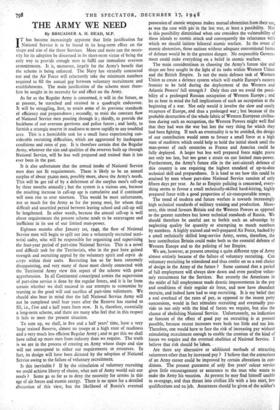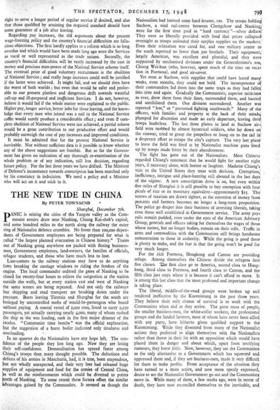THE ARMY WE NEED
By BRIGADIER A. H. HEAD, M.P.
IT has become increasingly apparent that little justification for National Service is to be found in its long-term effect on the shape and size of the three Services. More and more can the neces- sity for its adoption be discerned in its short-term virtue of being the only way to provide enough men to fulfil our immediate overseas commitments. It is, moreover, largely for the Army's benefit that the scheme is being enforced. The Navy has virtually contracted out and the Air Force will reluctantly take the minimum numbers required to fill the annual gap between voluntary recruitment and establishments. The main justification of the scheme must there- fore be sought in its necessity for and effect on the Army.
As far as the Regular Army is concerned, it will in the future, as at present, be stretched and strained in a quadruple endeavour. It will be struggling, first, to retain some of its previous standards of efficiency and preparedness ; secondly, to trairi the constant flow of National Service men pouring through it ; thirdly, to provide the backbone of our overseas garrisons and police forces ; and lastly, to furnish a strategic reserve in readiness to move rapidly to any troubled area. This is a formidable task for a small force experiencing con- siderable recruiting difficulties, which are aggravated by inadequate conditions and rates of pay. It is therefore certain that the Regular Army, whatever the size and qualities of the reserves built up through National Service, will be less well prepared and trained than it has ever been in the past.
It is also unfortunate that the annual intake of National Service men does not fit requirements. There is likely to be an annual surplus of about 50,000 men, possibly more, above the Army's needs. This will be got rid of by a- deferment of the surplus men's call-up by three months annually ; but the system is a vicious one, because the resulting increase in call-up age is cumulative and if continued will soon rise to over nineteen. This would be most unfortunate, not so much for the Army as for the young men, for whom that diffitult and unsettled period between leaving school and call-up will be lengthened. In other words, because the annual call-up is well above requirements the present scheme tends to be extravagant and inefficient in its use of our limited man-power.
Eighteen months after January 1st, 1949, the flow of National Service men will begin to spill out into a voluntarily .recruited terri- torial cadre, who will be responsible for organising and supervising the four-year period of part-time National Service. This is a novel and difficult task for the Territorials, who in the past have gained strength and recruiting appeal by the voluntary spirit and esprit de corps within their units. Recruiting has so far been extremely disappointing, and very many of those most closely connected with the Territorial Army view this aspect of the scheme with great apprehension. In all Continental conscripted armies the supervision of part-time service is done by the regular forces, and it is far from certain whether we shall succeed in our attempts to economise by trusting to the good will and sacrifice of part-time volunteers. We should also bear in mind that the full National Service Army will not be completed until four years after the Reserve has started to fill, i.e., five and a half years from now. It is, therefore, essentially a long-term scheme, and there are many who feel that in this respect it fails to meet the present situation.
To sum up, we shall, in five and a half years' time, have a very large trained Reserve, almost no troops at a high state of readiness and a very much less efficient Regular Army ; and to get this we shall have called up more men from industry than we require. The truth is we are in the process of creating an Army whose shape and size will not correspond to either our requirements or resources. In fact, its design will have been dictated by the adoption of National Service owing to the failure of voluntary recruitment.
Is this inevitable ? If by the stimulation of voluntary recruiting we could achieve liberty of choice, what sort of Army would suit our needs ? Some go so far as to deny the necessity for armies in this age of air forces and atomic energy. There is no space for a detailed discussion of this view, but the likelihood of Russia's eventual possession of atomic weapons makes mutual abstention from their use, as was the case with gas in the last war, at least a possibility. Nor is this possibility diminished when one considers the vulnerability of these islands to atomic attack and consequently the reluctance with which we should initiate bilateral atomic warfare. In the event of atomic abstention, those nations without adequate conventional forms of defence would be in the greatest danger. No responsible Govern- ment could stake everything on a belief in atomic warfare.
The main considerations in choosing the Army's future size and shape are best sought in the light of its tasks within Western Union and the British Empire. Is not the main defence task of Western Union to create a defence system which will enable Europe's eastern frontier to be held during the deployment of the Western and Atlantic Powers' full strength ? Only thus can we avoid the possi- bility of a prolonged Russian occupation of Western Europe ; and let us bear in mind the full implications of such an occupation at the beginning of a war. Not only would it involve the slow and costly recapture of Europe, and thus a prolonged war ; but because of the probable destruction of the whole fabric of Western European civilisa- tion during such an occupation, the Western Powers might well find that they had won the war but lost the very thing for which they had been fighting. If such an eventuality is to be avoided, the design of our contribution would seem to favour a small force at a high state of readiness which could help to hold the initial shock until the man-power of such countries as France and America could be fully deployed. A larger but less well prepared force might prove not only too late, but too great a strain on our limited man-power. Furthermore, the Army's future role in the anti-aircraft defence of this country is one requiring the highest standard of up-to-date technical skill and preparedness. It is hard to see how this could be attained by men whose part-time National Service consists of only fifteen days per year. As far as Empire policing is concerned, every- thing seems to favour a small technically-skilled hard-hitting, highly prepared force with a good proportion of air-transportable troops.
The trend of modern and future warfare is towards increasingly high technical standards of military training and production. More- over, this trend favours Britain and the Western Powers as opposed to the greater numbers but lower technical standards of Russia. We should therefore be careful not to forfeit such an advantage by neglecting quality for quantity or attempting to match numbers by numbers. A highly trained and well-prepared Air Force, backed by a small technically skilled long-service Army, seems, therefore, the best contribution Britain could make both to the essential defence of Western Europe and to the policing of her Empire.
We are, however, at present creating a quite different type of Army almost entirely because of the failure of voluntary recruiting. Can voluntary recruiting be stimulated and thus confer on us a real choice of design in the Army of the future ? Some contend that a period of full employment will always slow down and even paralyse volun- taiy recruitment for the Services. But recently the Americans in the midst of full employment made drastic improvements in the pay and conditions of their regular air force, and now have abundant recruits, and indeed have had to stop recruiting. It is my belief that a real overhaul of the rates of pay, as opposed to the recent petty concessions, would in fact stimulate recruiting and eventually pro- vide us not only with the kind of forces we require, but also the chance of abolishing National Service. Unfortunately, no indication or forecast of the effect of good pay on recruiting is at present possible, because recent increases were both too little and too late. Therefore, one would have to face the risk of increasing pay without stimulating recruitment enough to enable the creation of the kind of forces we require and the eventual abolition of National Service. I believe that risk should be 'taken.
Are there any alternative or additional methods of attracting volunteers other than by increased pay ? I believe that the attractions of an Army career could be improved by certain alterations in con- ditions. The present guarantee of only five years' colour service gives little encouragement or assurance to the man who wants to make the Army his vocation. At present he may find himself unable to re-engage, and thus thrust into civilian life with a late start, few qualifications and no job. Assurances should be given of the soldier's right to serve a longer period of regular service if desired, and also that those qualified by attaining the required standard should have some guarantee of a job after leaving.
Regarding pay increases, the old arguments about the present wage-freezing policy and the country's financial difficulties are falla- cious objections. The first hardly applies to a reform which is so long overdue and which would have been made long ago were the Services as vocal or well represented as the trade unions. Secondly, the country's financial difficulties will be vastly increased by the cost in money and precious man-power of the National Service scheme itself. The eventual prize of good voluntary recruitment is the abolition of National Service ; and really large increases could well be justified If the latter were achieved. It might fail, and we should then have the worst of both worlds ; but even that would be safer and prefer- able to our present planless and dangerous drift towards wasteful call-up and ill-prepared and inefficient Services. I do not, however, believe it would fail if the whole matter were explained to the public. Higher pay, longer service, better jobs for those leaving, and the know- ledge that every man who joined was a nail in the National Service coffin would surely produce a considerable effect ; and even if com- plete abolition of National Service were not achieved, a partial release would be a great contribution to our productive effort and would probably outweigh the cost of pay increases and improved conditions.
It must be _admitted that for the present National Service is inevitable. Nor without sufficient data is it possible to know whether any of the above suggestions are feasible. But so far the Govern- ment has given no indication of any thorough re-examination of the whole problem or of any indication, still less decision, regarding future policy. For the last three years we have drifted. The Minister of Defence's inconstancy towards conscription has been matched only by his constancy in indecision. We need a policy and a Minister who will act on it and stick to it.



































 Previous page
Previous page